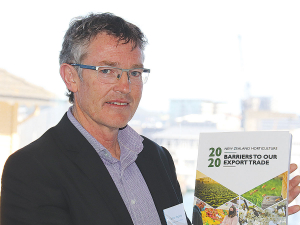Primary sector leaders praise speed and ambition of India–NZ free trade deal
Primary sector leaders have praised the government and its officials for putting the Indian free trade deal together in just nine months.
 Horticultural Export Authority (HEA) chief executive Simon Hegarty says the EU FTA is fantastic news for the NZ hort sector.
Horticultural Export Authority (HEA) chief executive Simon Hegarty says the EU FTA is fantastic news for the NZ hort sector.
The NZ horticulture sector stands to save nearly $80 million a year as a result of the recently negotiated Free Trade Agreement (FTA) with the European Union (EU).
According to the latest statistics from MPI, the EU is the largest overall market for NZ horticulture exports at just over $1 billion. The EU is our biggest market for kiwifruit and the second largest for apples (China is the largest importer of NZ apples).
Horticultural Export Authority (HEA) chief executive Simon Hegarty, whose role is to promote NZ horticultural exports and advocate for the freeing up of market access, says the FTA is fantastic news for the sector.
Hegarty told Hort News that back in 2018, at the start of the FTA negotiations, the HEA made detailed submissions to NZ's trade negotiations setting out the huge cost to the sector of EU tariffs.
"Every two years the HEA produces a large report on barriers to our export trade," he explains. "The EU was clearly the number one destination for us and the biggest overall component of our annual tariff costs."
Hegarty says the EU FTA will see the removal of approximately 60% of the sector's annual tariff costs globally, making it an important deal for NZ hort sector.
He says once the FTA is approved, it will immediately see the tariffs on NZ horticulture's big ticket exports to the EU - such as kiwifruit, onions and apples - removed, meaning savings for those sectors of $37m, $6.5m and $1.3m, respectively. It will also see tariffs on other products - such as frozen boysenberries, apricots, cherries, buttercup and squash removed.
"Well done to the Ministry of Foreign Affairs and Trade whose combined efforts and leadership resulted in this welcome agreement, from what has been a complex negotiation under testing conditions."
Hegarty concedes that gaining concessions for horticultural products in the FTA negotiations was much easier than for the livestock sector.
He says a lot of fruit is grown in European countries such as Spain, France and Italy. However, the EU also imports a lot of fruit in the off season - particularly from southern hemisphere countries such as NZ, South Africa, Chile and Peru.
"This is to keep supplies of healthy food products on supermarket shelves through the full 12 months of the year," he adds.
"Health and wellbeing is a big factor that drives peoples' choices and horticulture is very prominent in the health and wellbeing side of consumers' decisions," Hegarty explains.
"So, that's why horticulture products weren't seen as sensitive so much, relative to other food products."
Sweet Deal
Meanwhile, Hegarty told Hort News that at a time of massive freight disruptions, the deal has become even sweeter for NZ.
This is because the tariffs are set on what is called CIF - cost of the product, plus insurance and freight.
With freight rates skyrocketing, the cost of the tariffs would go up accordingly. However, under the EU FTA this extra cost won't come into play - hence the near $80 million annual saving.
Hegarty adds that the geopolitical situation is adding to the challenges facing horticultural exporters.
"With perishable products we can't afford to have containers sitting on wharves without power supplies or on vessels going to the wrong destinations," he explains.
"It's a high risk and it's been a really hugely difficult two years with all the disruption with freight and shipping."
However, Hegarty says the prospects for the products themselves are excellent so once things returns to some sort of normality he is very positive about the future prospects.
Hegarty believes it was good to get the deal signed now, rather than stalling the negotiations and risking being sent to the back of the queue.
Agrisea NZ has appointed Craig Hudson as it's new chief growth officer.
State farmer Landcorp, trading as Pamu, is a forecasting a full-year net profit of around $100 million.
Tony Aitken, chief executive of Ruralco, has been awarded the Excellence in Business Leadership Award at the ANZ Business of the Year Awards.
Global trade has been thrown into another bout of uncertainty following the overnight ruling by US Supreme Court, striking down President Donald Trump's decision to impose additional tariffs on trading partners.
Controls on the movement of fruit and vegetables in the Auckland suburb of Mt Roskill have been lifted.
Fonterra farmer shareholders and unit holders are in line for another payment in April.

OPINION: Here w go: the election date is set for November 7 and the politicians are out of the gate…
OPINION: ECan data was released a few days ago showing Canterbury farmers have made “giant strides on environmental performance”.